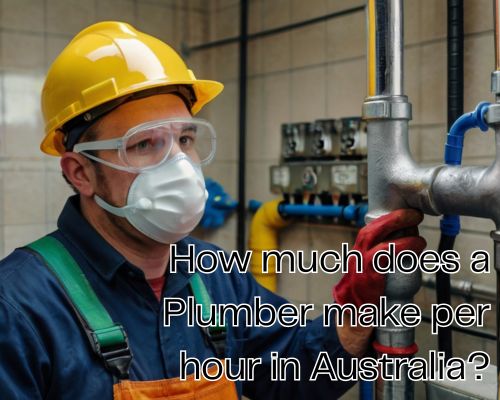How Much Does a Plumber Make Per Hour in Australia?
If you’re considering a career in plumbing or curious about trade salaries in Victoria, one of the most frequently asked questions is: How much does a plumber make per hour in Australia? In 2025, the plumbing industry continues to offer robust earning potential, job stability, and growth opportunities, especially in states like Victoria, where infrastructure development and residential construction remain active.

With Plumber Warragul, we’ll explore hourly wages for plumbers in Australia with a local focus on Victoria. We’ll also look at factors affecting plumber pay, types of plumbers, licensing requirements, and how Victorian plumbers compare nationally.
🚿 Average Hourly Wage for Plumbers in Australia
According to data from the Fair Work Ombudsman, plumbers in Australia earn between AUD $30 and $50 per hour on average, depending on experience, certification level, and location. This wage can rise significantly for licensed plumbers operating as contractors or in high-demand sectors like gas fitting and hydraulic services.
- Entry-level plumbers (0–2 years of experience): $28–$32/hr
- Mid-level plumbers (3–5 years): $35–$42/hr
- Experienced/licensed plumbers: $45–$60/hr+
- Emergency service or after-hours rates: $90–$150/hr
In metropolitan and regional areas of Victoria, these figures can skew slightly higher due to demand, especially in Melbourne, Geelong, Ballarat, and Bendigo.
💼 Plumber Salary in Victoria: What Sets It Apart?
Victoria’s construction and property sectors have rebounded post-pandemic, and a significant portion of this growth is tied to the increasing need for qualified tradespeople, particularly licensed plumbers. From residential home builds to large-scale commercial and infrastructure projects, plumbing professionals are integral.
Key salary influencers in Victoria:
- Urban vs. Regional Work:
In Melbourne, rates are typically higher due to cost-of-living adjustments and demand intensity. However, rural areas like Shepparton or Mildura may offer incentives, including accommodation or travel allowances. - Union Memberships:
Membership with entities such as the Plumbing and Pipe Trades Employees Union (PPTEU) can impact wages through negotiated rates and entitlements. - Specialisations:
Gas fitters, sanitary plumbers, roofing plumbers, and drainage specialists often earn above-average wages due to licensing complexity and safety risks. - Certifications & Licensing:
The Victorian Building Authority (VBA) oversees licensing for plumbers in the state. Fully licensed plumbers in Victoria command higher hourly rates compared to apprentices or journeymen.
🛠️ Apprenticeship vs. Licensed Plumber Pay
A typical plumbing career in Australia starts with an apprenticeship, generally lasting 4 years. During this period, apprentice plumbers in Victoria earn between $13 and $23 per hour, depending on their year of training.
Once fully licensed—after completing the Certificate III in Plumbing (CPC32420) and passing the VBA license exam—wages jump significantly. Self-employed plumbers or those running their own businesses can set their own rates, often charging $100+ per hour for service calls, especially during peak seasons or emergencies.
📍 Victoria-Specific Considerations
In Victoria, Australia, plumbing services are essential not only in residential projects but also in high-density commercial zones. The Big Build infrastructure program, driven by the Victorian Government, is further pushing demand for trades, including:
- Water infrastructure upgrades
- Commercial property developments
- High-rise residential builds in Melbourne’s inner suburbs
As a result, plumbers in Victoria—especially those working in construction or government-contracted roles—can expect more consistent work and stable income than in other states.
Moreover, Victoria enforces a strict compliance regime under the Plumbing Regulations 2018, making properly licensed professionals more in demand. See Plumber Warragul for more.
📈 Growth Outlook: Is Plumbing Still Lucrative?
Absolutely. The plumbing trade in Australia continues to rank high among vocational careers. Job Outlook Australia projects continued growth of 5–8% over the next five years. With a median age in the trade approaching 42, there’s a notable shortage of young licensed professionals, especially in rural Victoria.
Additionally, with increased awareness around sustainability and green plumbing practices—like solar hot water systems and rainwater harvesting—there are emerging niches within plumbing that command premium hourly wages.
💬 What Plumbers Themselves Say
Victorian-based plumbers interviewed by local job boards like Seek and Indeed Australia consistently cite the benefits of:
- Flexible hours
- Opportunity for self-employment
- Solid income potential
- High job satisfaction due to tangible results
One Melbourne-based plumber shared:
“When I started, I made around $32 an hour. Now, 8 years later and with a crew of my own, I’m charging $125/hr for after-hours jobs.”
👷♂️ Final Thoughts: What’s the Real Value?
If you’re evaluating plumbing as a career in Victoria, Australia, the average hourly rate is highly competitive compared to other trades and even some white-collar roles. With relatively low entry barriers, room for income growth, and consistent demand, plumbing offers a strong return on investment in terms of training and licensing.
Whether you’re a school leaver, mid-career switcher, or employer researching fair wages, understanding how much a plumber makes per hour in Australia, particularly in Victoria, reveals just how valuable this trade remains.
✅ Quick Recap: Plumber Pay in Victoria, Australia
| Experience Level | Hourly Pay Range | Notes |
|---|---|---|
| Apprentice (1st year) | $13–$18/hr | Based on standard award wage |
| Apprentice (4th year) | $20–$23/hr | Higher due to experience |
| Licensed Plumber | $40–$60/hr | Standard work during business hours |
| Emergency/Specialty | $80–$150/hr | After-hours or specialist services |
| Self-Employed | $100–$200/hr | Rate varies based on services offered |
For accurate and current rates, consult the Fair Work Australia Pay Calculator or the Victorian Building Authority.